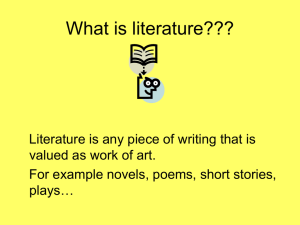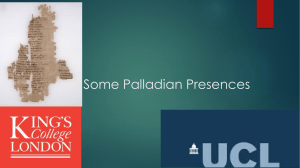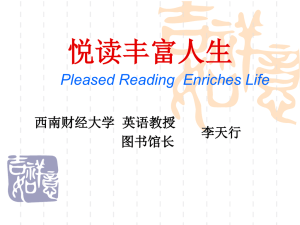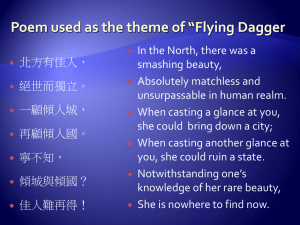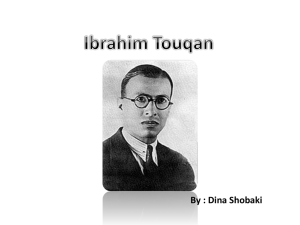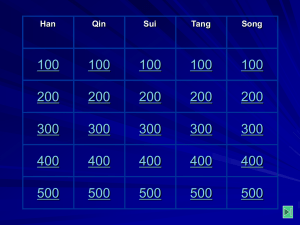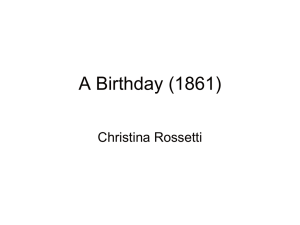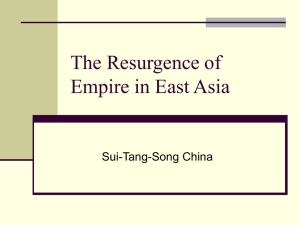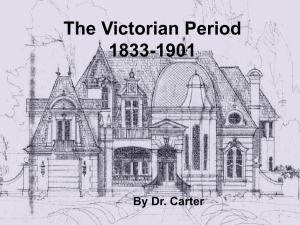李白lǐ bái - BYU Chinese Flagship Center
advertisement
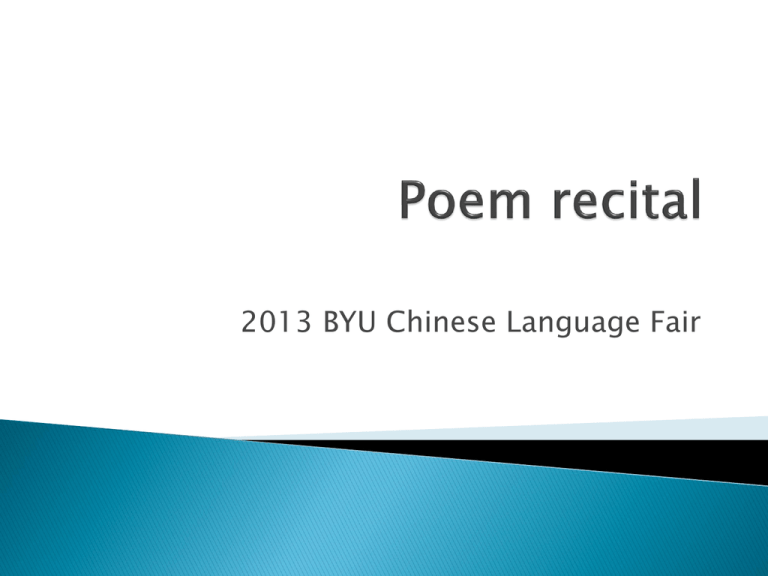
2013 BYU Chinese Language Fair chuáng qián míng yuè guāng 床 前 明 月 光 In front of my bed is the bright moonlight. yí shì dì shàng shuāng 疑 是 地 上 霜 I doubt if it was the frost on the ground. Jǔ tóu wàng míng yuè 举 头 望 明 月 I lift my head to look up at the August Moon. Dī tóu sī gù xiāng 低 头 思 故 乡 Lowering my head to think about my hometown. 李白 Lǐ Bái, (701 – 762) was a major Chinese poet of the Tang dynasty. He is regarded as one of the greatest poets often called China's "golden age" of classical Chinese poetry. Li Bai was both a prolific and a creative poet, as well as one who stretched the rules of versification of his time. Around a thousand extant poems are attributed to him today. http://www.youtube.com/watch?v=vY1I3cDP Kgk http://www.last.fm/music/Beto+Furquim/_/Ji ng+Ye+Si quàn jūn mò xī jīn lǚ yī 劝 君 莫 惜 金 缕 衣, Envy not the gold-threaded gown. quàn jūn xī qǔ shào nián shí 劝 君 惜 取 少 年 时。 Cherish your youth before it's gone. huā kāi kān zhé zhí xū zhé 花 开 堪 折 直 须 折, Pick the flowers when full-grown. mò dài wú huā kōng zhé zhī 莫 待 无 花 空 折 枝。 Don’t let them wither and fall down. 杜秋娘 dù qiū niáng was born in 865BC. She came from a poor family, but she was talented with singing, dancing, and poetry. With her talents, she was pointed to be one of emperor’ wives. There were very a few females’ Tang poems recorded. Her poem: Jin lu Yi was exceptional. https://www.youtube.com/watch?v=WjfPnyBP JjQ http://kid.qq.com/a/20120206/000022.htm Cí mǔ shǒu zhōng 慈 母 手 中 xiàn 线, A loving mother busied herself with needlework On clothes for a son who was going away; Yóu zǐ shēn shàng yī 游 子 身 上 衣; Lín xíng mì mì féng 临 行 密 密 缝, On the eve of his departure she sewed thread after thread, Yì kǒng chí chí guī 意 恐 迟 迟 归; Worrying that his return would be delayed and late. Shéi yán cùn cǎo xīn 谁 言 寸 草 心, How could the love of grass only inches tall Bào de sān chūn huī 报 得 三 春 晖。 Ever reciprocate spring after spring of sunshine day after day? 孟郊Mèng Jiāo; (751–814) was a poet of the Tang Dynasty, in China. he wrote many successful poems. He was an influential leader in terms of poetic innovation. http://xy.eywedu.com/ancient/14/mydoc005 .htm https://www.youtube.com/watch?v=lAQupfR oLjs xī 昔 rén yǐ chéng huáng hè 人 已 乘 黄 鹤 Where long ago a yellow crane bore a sage to heaven, cǐ dì kōng yú huáng hè 此 地 空 余 黄 鹤 Nothing is left now but the Yellow Crane Terrace. huáng hè yī qù bù fù 黄 鹤 一 去 不 复 The yellow crane never revisited earth, bái yún qiān zài kōng yōu 白 云 千 载 空 悠 And white clouds are flying without him for ever. qíng chuān lì lì hàn yáng 晴 川 历 历 汉 阳 ...Every tree in Hanyang becomes clear in the water, fāng cǎo qī qī yīng wǔ 芳 草 萋 萋 鹦 鹉 And Parrot Island is a nest of sweet grasses; rì mù xiāng guān hé chù 日 暮 乡 关 何 处 And Parrot Island is a nest of sweet grasses; yān bō jiāng shàng shǐ rén 烟 波 江 上 使 人 With a mist of grief on the river waves. qù 去, lóu 楼。 fǎn 返, yōu 悠。 shù 树, zhōu 洲。 shì 是? chóu 愁。 崔颢 Cuī Hào; (704 754) was a Chinese poet of Tang Dynasty. He poems considered a main early classical Chinese poetry. http://kid.qq.com/a/20120425/000026.htm http://www.youban.com/media-27465460.html

